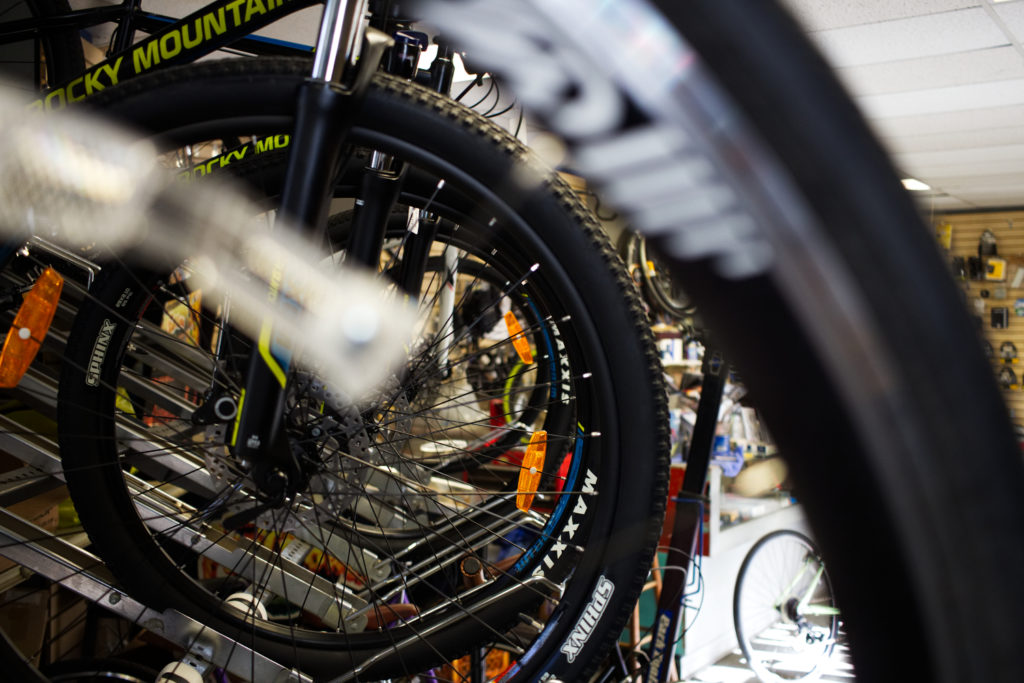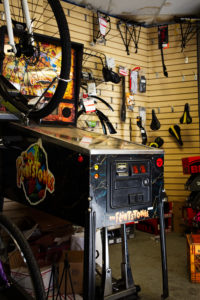Iron City Bikes Serves Steel City Cyclists

words: Seth Culp-Ressler
photos: Seth Culp-Ressler
It’s a chilly November afternoon, the first taste of the coming winter, as Richard Jezowicz sits bundled up behind the counter at Iron City Bikes, microwave dinner in hand. It’s been a day devoid of customers. That means no body heat to get the small shop comfortable, either.
Jezowicz is a mechanic and salesperson at Iron City, the sole bike shop within Oakland’s boundaries. As such, the small triangular building perched on the corner of South Bouquet Street and Joncaire Street has become the hub for the rapidly-changing bike culture of the surrounding community.
While Iron City has expanded its reach throughout the Pittsburgh area — it launched a large showroom in Lawrenceville around three years ago — Oakland is the original location, opened more than a decade ago. With no nearby competition it’s a prime spot for a bike shop, and the neighborhood is full of customers who need to keep their bicycles in tip-top shape.

Pinball is on hand for waiting customers.
Oakland’s universities provide for a large portion of Iron City’s business, many of their students taking up biking to cut down their class commute times. Sreeram Ravi, a student at the University of Pittsburgh and the president of Pitt Cycling, says there is an obvious interest from college kids when it comes to riding. Getting people into the hobby safely, however, is always a challenge.
“The central hub of Oakland is still a little bit too dangerous for bicyclists, but I feel like there’s a lot of people that want to get out there and ride,” Ravi says. “We get a bunch of questions about how you ride in Oakland.”
Community members who walk or bike have been concerned ever since October of 2015, when Susan Hicks, a University of Pittsburgh administrator, was killed while commuting on her bicycle. Three days later, a husband and wife were struck and killed after getting off of a Port Authority bus.
Yet, even with those memories at the forefront of many people’s minds, both Ravi and Jezowicz note that more and more bikers are taking to the streets and sidewalks of the neighborhood. A large reason for that has been a boom in bike-friendly infrastructure.
“With the bike lanes, we have a lot more people that, every year, are slowly incorporating into riding three to four seasons instead of just one to two,” Jezowicz says.
Those bike lanes are slowly being integrated into the neighborhood’s streets, the largest of which currently runs along Bayard Street and Bigelow Boulevard. They’re all part of an effort to transform Oakland — and Pittsburgh at large — into a friendlier environment for bikers and pedestrians alike.
As Ravi points out, though, the two largest thoroughfares — Forbes Avenue and Fifth Avenue — have no such protection for bikers. Pitt Cycling is currently working with local bicycling advocacy group Bike PGH to lobby for expanded bike lanes throughout the Oakland community.
That said, the already-existing bike lanes, along with the Healthy Ride bike share program, are the clear drivers of Oakland’s increased bicycle traffic. The problem with the influx, as Jezowicz points out, is that not all of these bikers are hitting the street with the same experience level. Having extreme novices on the roads of an urban environment can be a dangerous proposition.
“You do have a lot of people that are getting into the bike culture, so-to-speak, and they feel like, ‘Well [I’m] just on a bike what am I going to do? I’m going to go down one-ways the wrong way, I’m going to run red lights because people are supposed to be watching me,’” he explains.

Iron City’s bright yellow shop is hard to miss.
The drastic skill gap can be unsafe even between bicyclists, Jezowicz says. An unpredictable rider is, after all, unpredictable for everybody using the road, not just cars. In an attempt to curb risky behavior, both Pitt Cycling and Iron City Bikes are working to make sure all new bikers are prepared to safely navigate their commutes.
Ravi says that, in addition to providing pointers to new riders, Pitt Cycling also holds regular classes to teach students how to properly care for their bikes — everything from basic maintenance to winter prep. Building an educated population of bikers is key to building a healthy bicycle culture.
For Iron City, Jezowicz says that they’ve noticed a marked increase in customers buying safety equipment, be it for their own bicycles or for the Healthy Ride bikes. He’s happy to see it, because proper safety involves every occupant of the road. And, of course, more bikers also mean more business for Iron City.
Nevertheless, patrons aren’t showing themselves today. Jezowicz isn’t too surprised. For Iron City, the colder months are, predictably, the slow season. His main concern for the longevity of the shop is merely that their customers are behaving out on the roads of the city.
As he says with a laugh, “We can’t sell you stuff if you die, so just follow the rules!”
 Previous Post
Previous Post Next Post
Next Post